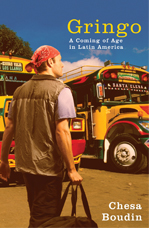| Sun | Mon | Tue | Wed | Thu | Fri | Sat |
|---|---|---|---|---|---|---|
| 1 | 2 | 3 | 4 | 5 | ||
| 6 | 7 | 8 | 9 | 10 | 11 | 12 |
| 13 | 14 | 15 | 16 | 17 | 18 | 19 |
| 20 | 21 | 22 | 23 | 24 | 25 | 26 |
| 27 | 28 | 29 | 30 | 31 |
CATEGORIES
RECENT ENTRIES
BLOG ROLL
Accidental gringo
 Maybe it was last week’s scathing review of his new book, Gringo: A Coming of Age in Latin America, in the New York Times. Maybe it was his hometown draw as a '99 alumnus of the Laboratory Schools. Maybe it was his famous radical parents, David Gilbert and Kathy Boudin, jailed for their activities with the Weather Underground. Whatever the reason, Chesa Boudin—author, traveler, Rhodes Scholar, and Yale law student—packed a seminar room in Kelly Hall for Monday’s lunchtime talk and book signing. His presentation, jointly sponsored by the Center for Latin American Studies and the Human Rights Program, focused on the lessons he says Americans can learn if they pay closer attention to the region’s shifting political and social movements. Boudin, 28, spent eight of the past ten years crisscrossing the continent—studying Spanish in Guatemala, descending the Cerro Rico mines in Bolivia, riding a cargo boat down the Amazon, and serving as a foreign-policy adviser to President Hugo Chávez in Venezuela. So maybe the audience showed up because they were interested in what he had to say. Here are some excerpts.
Maybe it was last week’s scathing review of his new book, Gringo: A Coming of Age in Latin America, in the New York Times. Maybe it was his hometown draw as a '99 alumnus of the Laboratory Schools. Maybe it was his famous radical parents, David Gilbert and Kathy Boudin, jailed for their activities with the Weather Underground. Whatever the reason, Chesa Boudin—author, traveler, Rhodes Scholar, and Yale law student—packed a seminar room in Kelly Hall for Monday’s lunchtime talk and book signing. His presentation, jointly sponsored by the Center for Latin American Studies and the Human Rights Program, focused on the lessons he says Americans can learn if they pay closer attention to the region’s shifting political and social movements. Boudin, 28, spent eight of the past ten years crisscrossing the continent—studying Spanish in Guatemala, descending the Cerro Rico mines in Bolivia, riding a cargo boat down the Amazon, and serving as a foreign-policy adviser to President Hugo Chávez in Venezuela. So maybe the audience showed up because they were interested in what he had to say. Here are some excerpts.
Why the book
Over the course of ten years of travel in Latin America, I came to believe that there was a story I could share that was worth sharing, that the on-the-ground experiences I had, the people I came across, the friendships I built were worth recounting to a broader audience. Not that Latin Americans aren’t capable of telling their own stories or sharing their own voices, but all too often the Latin American voices that get shared in this country are of a very narrow sector that’s not representative certainly of the social movements that I find so exciting and that have really been shaking up the region for the last ten years.
A few policy recommendations
Today in the United States, we have a unique and particular opportunity to redefine for the better our relationship with Latin America. There are three particular areas where Obama has opportunities that have vast implications for domestic policy as well as U.S. foreign policy in the region. First is the relationship with Venezuela and Cuba, which has been so strained. He can alleviate that tension and bring both of those countries back into normal diplomatic relations with the United States if he chooses to do so. The second is the war on drugs. It’s high time that the government in this country recognized it as a costly failure. Last is immigration. We should recognize the crucial role that immigrants play not only to our economy but also to the culture. It’s unconscionable that we continue to criminalize and incarcerate immigrants who come here looking for a better way of life.
How he travels
Many of the stories I ended up writing about were accidental. I don’t generally plan details, beyond visas, in advance. There’s a real advantage to not planning your trips carefully. When you’re doing overland travel, there’s a real advantage of having that flexibility because it allows you to get off the bus when a person says "Why don’t you stay at my family’s house tonight?" If I’d been flying in and out of capital cities, not only would my understanding of the region as a whole been fragmented, but I would have missed out on some of the best opportunities to get to know people in the countries I was visiting.
Why Gringo isn’t a tell-all memoir
The book has 85,000 words and about 3,000 of them are about my parents. It’s a theme of the book; it’s something I reflect on at various points, but it’s not the focus at all, and every situation where I bring them up I do it consciously within a context of a focus on Latin America.
April 21, 2009
